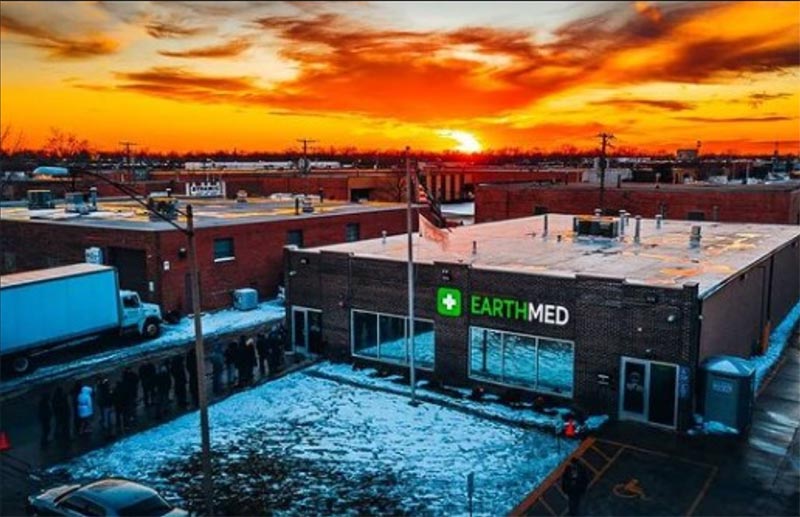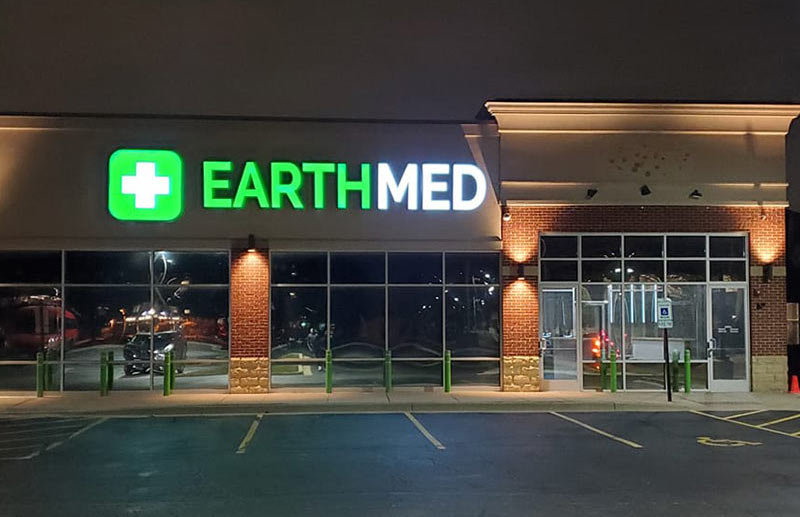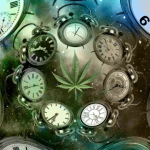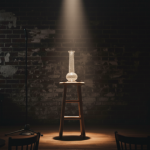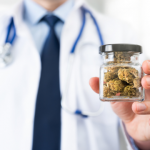Are you at least 21 years of age or hold a valid medical marijuana card?
Daily Specials
{{ special.title }}
{{ special.description }}
*{{ note }}EARTHMED BLOG

Higher THC Doesn’t Necessarily Mean Stronger Weed
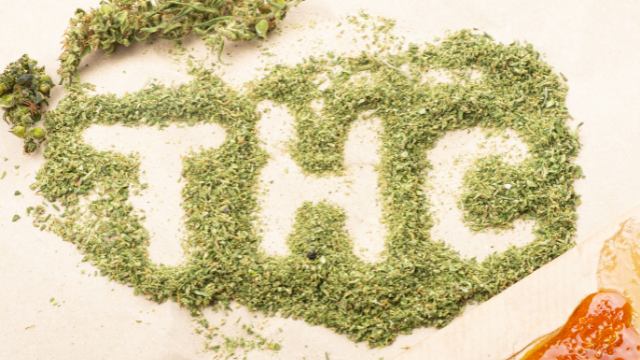
With an increased number of states legalizing marijuana for both medical and recreational users, more weed dispensaries are opening across the country. These licensed cannabis dispensaries are selling marijuana products that are labeled with the amount of THC contained.
When you visit a cannabis dispensary, you’ll notice that the percentage of Tetrahydrocannabinol (THC) is prominently displayed on all packaging of cannabis products. THC is considered the main indicator of how potent the weed is and how high the consumer will get after using marijuana, and with high-THC weed, they don't have to consume more cannabis to get potent effects. In theory, weed with a higher THC makeup should make you feel higher and allow you to experience the sought-after psychoactive effects that the THC compound produces.
Marijuana Industry & THC
This is the message that the marijuana industry markets to weed consumers. Growers and dispensaries use powerful branding and packaging, making THC the highlighted feature on the label. So, most stoners are looking at two factors to determine the quality of the weed before they make a purchase: price per ounce and THC percentage.
Weedmaps listed a nice visual of THC percentages and how they are classified in the cannabis industry to market weed to consumers. They presented this data from Flowhub from 2020.
Marijuana products are categorized as being:
- Very High THC (>28% THC)
- High THC (21-28% THC)
- Medium THC (14-21% THC)
- Low THC (7-14% THC)
- Very Low THC (<7% THC)
“The higher the THC, the stronger the weed” has been ingrained in every consumer's mind, but maybe that’s what marketers want you to believe, so you continue to purchase expensive, “high-quality,” high THC percentage marijuana. Maybe weed with higher THC is not all it’s cracked up to be.
Cannabis Study from the University of Colorado Boulder
In fact, a recent study conducted by researchers at the University of Colorado Boulder shows this theory to be far from true. The main goal of the study was to determine how regular cannabis concentrate and marijuana flower users are affected in terms of impairment, intoxication, and cognitive behavior when using cannabis products with high THC.
In this CU Boulder study, 121 participants were split into two groups and were assigned randomly to the different control groups. One group was asked to use cannabis concentrates within a range of 70% - 90% THC, while the other group was asked to smoke marijuana flowers with THC percentages of 16% - 24%. In order to do this research legally, the candidates in the study had to purchase their own weed from a dispensary, and the experiment had to be done in a mobile laboratory off-campus premises.
The experiment was controlled by taking each participant’s blood at three distinct time points during the test, before consuming the high THC weed, immediately following consumption, and finally one hour after smoking or consuming the marijuana.
The researchers predicted that the regular consumers using higher THC concentrates would feel the effects of the THC high more so than those using the marijuana flower at significantly less THC percentages.
Results of the Marijuana Study
What they found was that those that consumed the cannabis concentrates had higher blood plasma levels than the marijuana flower control group. This was expected, but what wasn’t expected was that both groups - the marijuana flower and weed concentrate groups - reacted very similarly to the differing amounts of THC.
Both groups were impacted the same way in terms of having impaired balance and memory. Even the self-reported level of how high each candidate felt was similar.
This did not align with the hypothesis of the research. The researchers determined that higher THC in marijuana didn’t necessarily mean greater intoxication or high.
They gave a few reasons why this could be the case, including the following:
- They studied a group of people who regularly consume weed and, therefore, may have built up a tolerance over the course of their use.
- Results could be due to genetics that may allow individuals to metabolize THC at different rates.
- When cannabinoids receptors in the brain are full, any additional cannabinoids, THC, could have very little effect.
Ultimately, this study disproved the myth that more THC in cannabis gets you higher.
What really determines the high?
It’s important to remember that every consumer has a different experience with cannabis. Two stoners could enjoy the same marijuana strain yet have entirely different effects. Microdosing high THC weed over time can further influence how an individual is affected by new strains.
High THC shouldn’t be the only determining factor when it comes to buying weed. There’s much more to choosing a strain than simply THC. Consumers should take it upon themselves to become educated on certain strains, so they can find the best weed for them. Things like the flavor, taste, scent, immediate and long-term effects are all very important to know, and you can determine this with just a bit of research.
The “entourage effect” is how the combination of terpenes and cannabinoids (THC & CBD) work together to produce the effect that the marijuana will give you. This pairing is what provides the high that you feel when consuming weed. Terpenes only boost the effectiveness of THC & CBD. Think about it this way. If you choose a terpene profile with a delicious flavor and an enjoyable scent, you may have a better experience regardless of the percentage of THC that makes up that particular marijuana strain. Paying attention only to the high THC percentage in marijuana may eliminate the possibility of you discovering the best strain for you.
So, with this research, the myth that the higher the THC, the stronger the weed, we’ve determined, is not always the case. Do some research to learn about what you want your marijuana to do for you. If you have a certain qualifying medical condition, it’s good to know what the effects of certain cannabis strains are, as they help with specific symptoms.
The next time you come to an EarthMed dispensary, ask a budtender for a recommendation on a particular strain based on your needs and your ideal high, and they will be thrilled to impart their cannabis knowledge upon you.
{{ locations[0].name }}
{{ locations[0].address }}{{ locations[0].city }}, {{ locations[0].state }} {{ locations[0].zip }}
{{ locations[0].phone }}
Hours
Sun: {{ locations[0].hours_recreational.Sunday }}Mon: {{ locations[0].hours_recreational.Monday }}
Tue: {{ locations[0].hours_recreational.Tuesday }}
Wed: {{ locations[0].hours_recreational.Wednesday }}
Thu: {{ locations[0].hours_recreational.Thursday }}
Fri: {{ locations[0].hours_recreational.Friday }}
Sat: {{ locations[0].hours_recreational.Saturday }}
{{ locations[1].name }}
{{ locations[1].address }}{{ locations[1].city }}, {{ locations[1].state }} {{ locations[1].zip }}
{{ locations[1].phone }}
Hours
Sun: {{ locations[1].hours_recreational.Sunday }}Mon: {{ locations[1].hours_recreational.Monday }}
Tue: {{ locations[1].hours_recreational.Tuesday }}
Wed: {{ locations[1].hours_recreational.Wednesday }}
Thu: {{ locations[1].hours_recreational.Thursday }}
Fri: {{ locations[1].hours_recreational.Friday }}
Sat: {{ locations[1].hours_recreational.Saturday }}
